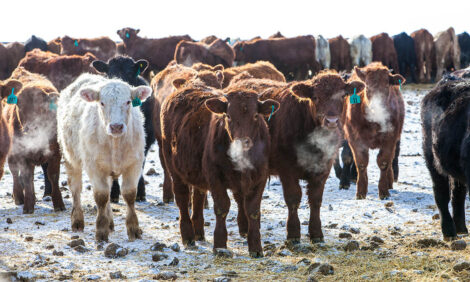



Ag Economist discusses pandemic changes to beef cattle industry
A top analyst said recently that the COVID-19 pandemic has caused several changes in the beef industry, many of which could be here to stay.Jayson Lusk, Distinguished Professor and head of the Department of Agricultural Economics at Purdue University, was a featured speaker during the 108th annual K-State Cattlemen’s Day. His talk focused on the impacts of the pandemic on the beef cattle sector.
Listen to an interview by Eric Atkinson with Jayson Lusk on the weekday radio program, Agriculture Today
Among the highlights of his talk:
Online purchases of meat…
“We see a lot more purchasing of food through online channels; I think we’ll continue to see that, even for meat. We just recently did a survey (in February) of consumers, and 25% said they’ve bought meat online in the last month. That will continue to be a trend as we move forward.
“In the future, grocery stores may start to look a little different. In some cases as more food is being bought online, some of these retailers may find it profitable to create these micro-fulfillment centers, or what they’re calling dark grocery stores. Essentially all they’re doing is filling online orders that are now taking place inside the grocery store.”
Automation in the industry…
“I think we’ll probably see a push toward automation, particularly in the packing sector. Labor has been an issue for a long time, and I think we’re just in a different dimension of labor challenges for that industry. I think we’re likely to see investments in automation in that sector, and maybe even in the food retail sector.”
Impacts to restaurants…
“Who knows exactly how the food service sector is going to come out of this, what’s going to happen to restaurants. Some fast food chains have been just fine; sales through drive thru have remained fairly strong. But it will be interesting to see how it plays out for the more traditional, sit-down restaurant sector. People have spent more time cooking at home and it may be something they stick with more than they have in the past.”
Consumer interest in locally sourced products…
“Partly because of some of the shutdowns we saw in meatpacking, there’s been a rising interest in sourcing meat from local segments, maybe direct delivery from small or medium sized packers. That’s an opportunity that will grow and there will be some niche opportunities there. This will probably remain a small piece of the overall story, but still an opportunity that does exist for certain entrepreneurs.”
Effect of higher grain prices…
One thing we’re seeing happening on the grain side is prices are being pulled up. I don’t know how much that is due to the infusion of cash from the government as opposed to other things, such as bad weather this summer in the Midwest and increased imports by China. But that will affect the cattle cycle because we’ve got feed prices that have increased significantly the past several months. That will affect decisions of whether folks decide to hang on to some inventory or let them go if it’s going to cost too much to keep them around.”
Cattle ID and other tracking efforts…
“The cattle producers I know are a very independent bunch. Nobody wants the government tracking who they are and where they are. I completely get that. At the same time, you’ve got a system where consumers want to know more about where their food came from… If you want to capture the value that is being created there, you may have to give up some of that autonomy and transparency. Maybe some people don’t want to do it, but for those that will and are, I think there is a market opportunity.”
Lusk’s complete talk and other presentations from this year’s K-State Cattlemen’s Day are available online at asi.ksu.edu/cattlemensday.
TheCattleSite News Desk


